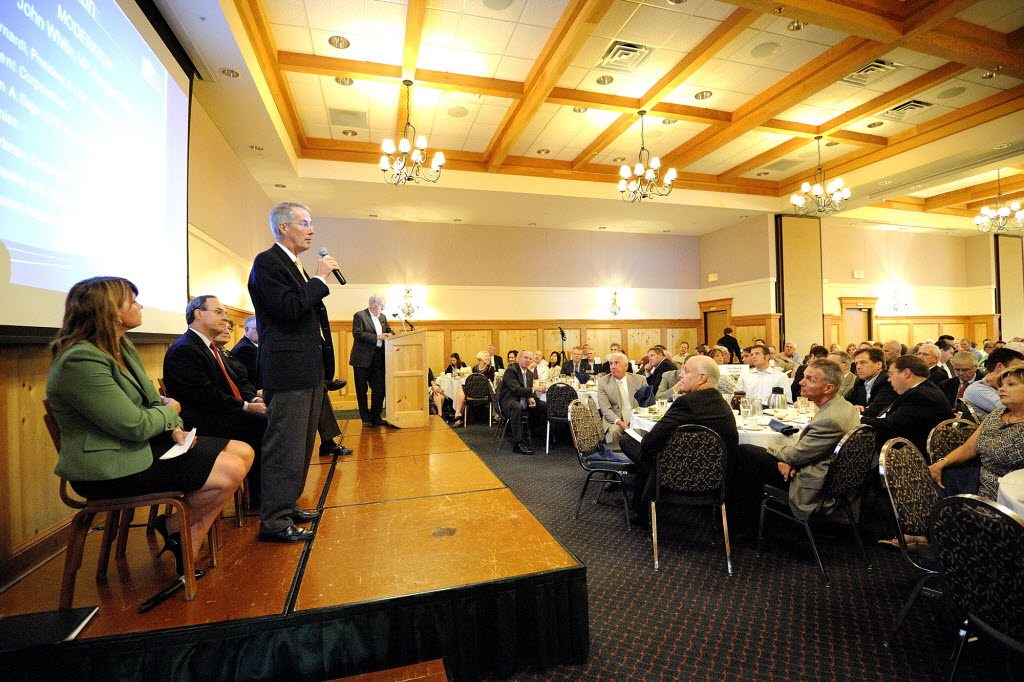The Clark County Economic Development Plan, produced by TIP Strategies, was commissioned by the nonprofit Columbia River Economic Development Council for $80,000.
Clark County possesses key assets in education, health care and international trade that, if leveraged successfully, will position it for growth, the author of the county’s new draft economic development plan said Thursday.
“You have opportunities for growth even as the nation’s economy stumbles along,” said Jon Roberts, principal of Austin, Texas-based TIP Strategies, who oversaw development of the 127-page plan.
Using a Power Point presentation, Roberts rolled out the plan to a lunchtime gathering of more than 300 people at the Heathman Lodge in Vancouver. The event, held by the Columbia River Economic Development Council — the county’s chief jobs promoter — also featured a panel discussion of the plan.
WSUV, health care
Roberts said relationships between Washington State University Vancouver and the county’s business community must be strengthened. And regional leaders should accelerate efforts to develop a business-oriented research park.
Roberts said WSUV needs to expand class offerings and to boost its role in creating economic growth. He cited data showing that the jobless burden in the U.S. is shared unevenly. People who lack a high school diploma are experiencing a jobless rate of 13.7 percent, while 7.4 percent of those with college degrees are unemployed.
“Any region that isn’t committed to higher education and higher-education training is likely to suffer significantly high unemployment,” Roberts said.
During the panel discussion, Lynn Valenter, interim chancellor for WSUV, said about 75 percent of the university’s students stay within the Portland-Vancouver region after they graduate, contributing to the economic vitality of the region.
But tuition hikes are not enough to make up for cuts to state higher education funding, Valenter said, and that limits the university’s ability to meet local needs.
The university, and other regional leaders, will have to get creative, she said.
Roberts said the county needs to become a hub of “health information management,” a niche in which tech-minded people develop portable electronic medical records, produce security systems to protect them from cyber thieves and otherwise advance the role of information technology in health care.
Roberts said such an effort is more important now than ever considering that PeaceHealth, a $2 billion health care company, is the new parent company of Southwest Washington Medical Center (now called PeaceHealth Southwest Medical Center).
Panelist Dr. Mark Wheeler, who oversees information technology for PeaceHealth, said health care information technology is going to grow faster than the overall health care industry.
And Clark County is going to get a chunk of that growth as PeaceHealth, which already is bringing some 600 jobs as it centralizes its operations in Vancouver, expands its information technology division.
Trade, energy
At one point during his presentation, Roberts turned the audience’s attention to international trade, noting that more countries are purchasing U.S. goods and services. “The Chinese like Buicks,” he said. “Honestly, they do.”
That presents an opportunity for Clark County’s ports, he said.
Panelist Rob Bernardi, president and chief operating officer for Kokusai Semiconductor Equipment Corp., brought energy concerns to the forefront.
Bernardi, chairman of the Clark County High Tech Community Council, said the region’s “cheap and predictable power” has attracted major high-tech and industrial employers to the county.
To protect that asset, he said, the high-tech council will work with others during the next state legislative session to try to make changes to Initiative 937 — the state’s voter-approved renewable-energy law — to make it more friendly to business.
Accountability
Ron Arp, a Clark County public affairs consultant who attended Thursday’s event, during a question-and-answer session said his concern is that the county’s new draft economic development plan will end up collecting dust on a shelf.
What will the county do to make sure the plan is put into action? Arp asked.
Eric Fuller, a commercial real estate broker with Eric Fuller & Associates Inc. in Vancouver and board chairman for the Columbia River Economic Development Council, said it’s the CREDC’s responsibility to bring together the county’s local governments, ports, companies and educational institutions to make the plan a reality.
The CREDC is accountable, Fuller added, so if you don’t see results as quickly as you’d like, “call us.” training is likely to suffer significantly high unemployment,” Roberts said.




